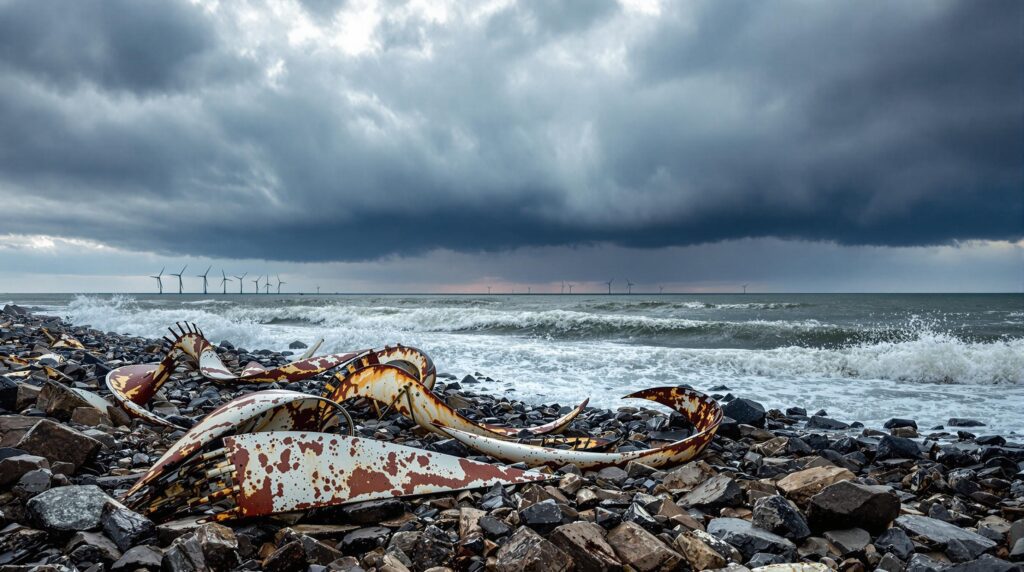A Clean Energy Setback Under Trump
In a significant reversal that highlights stark political divides over environmental policy, a critical environmental permit for New Jersey’s ambitious Atlantic Shores Offshore Wind project has been revoked under President Trump’s administration. The revocation—issued by Environmental Appeals Court Judge Mary Kay Lynch—puts the future of this promising renewable energy initiative perilously in doubt. It’s a decision that echoes Trump’s well-documented skepticism toward renewable projects, notably offshore wind energy, which he has frequently criticized as “eyesores” and harmful to economies dependent on tourism and fishing.
Judge Lynch’s decision leverages Trump’s January directive that effectively paused new offshore wind projects pending additional reviews. This drastic move is stirring concerns among renewable energy advocates who see this as more than an isolated incident, raising fears of broader efforts to rollback forward-looking environmental commitments from the Biden era.
The permit’s withdrawal particularly underscores the contentious issue of regulatory consistency crucial to major energy initiatives. Without this critical stability, industry experts warn that America’s leadership in renewable energy could falter, potentially hindering both environmental progress and economic competitiveness internationally.
Local Opposition and Environmental Concerns
At the local level, the pushback against offshore wind projects has been vocal and influential. Community groups such as Save LBI have highlighted specific environmental concerns, notably about the project’s approach to air quality assessment. Critics assert that the Atlantic Shores Offshore Wind project initially overlooked critical factors during its environmental review—particularly emissions tied to pile-driving during the construction phase. These communities, celebrated among conservative circles for their persistence, view the permit revocation as not only a political triumph but also a validation of their environmental worries.
Yet, it is critical to gauge these concerns in the broader environmental and economic context. While project-specific environmental reviews are undeniably essential, sweeping decisions that impede progress on renewable infrastructure risk neglecting the urgency needed to transition away from fossil fuels. Focusing narrowly on the procedural elements of regulation can inadvertently bolster continued reliance on environmentally damaging energy sources like coal and oil.
“This ruling highlights the delicate balance between local environmental accountability and the global imperative to act swiftly on climate change.”
The decision has also emboldened other opposition groups across the nation, raising alarms about potential cascading effects that could result in more widespread setbacks for similar renewable energy projects. Amid the celebrations by local opposition, many residents supportive of clean energy are expressing concern, realizing how such legal tactics might broadly hobble sustainable development.
The Economics of Renewable Energy Uncertainty
The economic ramifications of Judge Lynch’s ruling may reverberate far beyond the Jersey Shore. Industry representatives stress that significant investment in renewable infrastructure hinges largely on regulatory predictability. Atlantic Shores spokespersons underscored this perspective, emphasizing that the ruling could deter broader industry investment by signaling that even federally-approved projects are vulnerable to politically-motivated cancellations.
Leaders within renewable energy sectors understandably warn that this climate of regulatory volatility could prove costly—economically, environmentally, and in global reputation. Investors may view the United States as increasingly hostile territory, redirecting capital and innovation to more welcoming shores like those seen in Europe and Asia, where offshore wind projects are rapidly flourishing.
This is particularly concerning given America’s urgent environmental imperatives coupled with the job creation potential inherent within renewable projects. In reality, offshore wind installations like Atlantic Shores not only promise substantial reductions in carbon emissions but also represent the kind of economically sustaining projects that could rejuvenate struggling coastal economies. Transitioning to renewable energy should be seen not as an economic hindrance but as a vibrant source of economic stability and growth. A failure to recognize and achieve this understanding risks lagging significantly behind our international peers who increasingly dominate renewable technology markets.
Looking Forward: The Need for Consistent Leadership
The unfolding circumstances around the Atlantic Shores Offshore Wind project highlight an urgent broader question: What kind of leadership and policy vision will best serve the American people and our planetary future? President Trump’s intervention clearly shows the impacts of political dynamics on environmental stewardship and economic innovation. In stark contrast to earlier federal momentum supporting offshore wind development, this administration’s actions exemplify policy regression, likely brought upon by adherence to outdated ideologies around energy and the environment.
We must remember that addressing climate change effectively requires consistent policy support and measurable action across administration transitions. It’s not only about preserving the environment— it’s fundamentally about safeguarding a sustainable and prosperous future, marked by equity and resilience in the face of shifting global realities. Initiatives like the Atlantic Shores Offshore Wind project symbolize the possibilities of this transformative vision, and their successful realization depends profoundly on unwavering governmental backing and clear regulatory pathways.
As we watch developments unfold, the stakes reach far beyond a single project’s fate. They signal deeply-held values and critical priorities, challenging each of us to consider carefully the trajectory we wish to endorse and sustain—one that cements reliance on past models or one determined to innovate for our collective, sustainable future.

